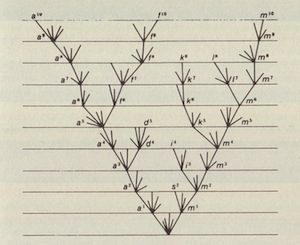Some people
and poets
feel it
and fear it
above all else
prematurely
pre-emptively
life-long.
I didn’t.
Till you died.
Then I felt it.
But not feared it.
My fear
had already befallen.

Stevan Harnad
Some people
and poets
feel it
and fear it
above all else
prematurely
pre-emptively
life-long.
I didn’t.
Till you died.
Then I felt it.
But not feared it.
My fear
had already befallen.
 Inside Job is a documentary film written and directed by Charles H. Ferguson. It tries to illustrate through narration and interviews how the global financial crisis of 2008 was the result of deregulation of banking and the resulting unregulated growth of “derivatives” in which bad debts are packaged together and repeatedly resold in what amounts to a massive pyramid scheme, with investment banks hedging their bets by encouraging bad loans, receiving high fees, offloading them on other lenders, and then betting that they will default.
Inside Job is a documentary film written and directed by Charles H. Ferguson. It tries to illustrate through narration and interviews how the global financial crisis of 2008 was the result of deregulation of banking and the resulting unregulated growth of “derivatives” in which bad debts are packaged together and repeatedly resold in what amounts to a massive pyramid scheme, with investment banks hedging their bets by encouraging bad loans, receiving high fees, offloading them on other lenders, and then betting that they will default.
Complicit in this are banking executives, credit rating agencies, politicians (lobbied by the extremely wealthy financial industry), presidential appointees (often former and future banking executives), corporate lawyers, and economists (often likewise drawing large consultant fees from the financial industry), greatly weakened regulatory agencies and regulatory laws, and legions of greedy, risk-prone traders.
The 2008 financial crash in Iceland is presented as a harbinger and microcosm for the phenomenon.
Reminiscent of the film The Corporation, Inside Job’s premise is that enormous incentives together with lack of controls and answerability create an industry that behaves like a sociopath, pursuing its interests relentlessly, at the expense of that vast majority of poor people who end up having paid for it.
The most worrisome conclusion is that even after the evidence of the global financial crash that such unregulated trading has induced, many of the very same people who brought it on are still in power and perpetuating the same system, despite minor cosmetic reforms, because of the undiminished resources and lobbying power of the financial industry.
The sociopathy seems to be scale-invariant: It is present at the level of the banking industry, which is not an individual sentient human being but a virtual entity created by human laws and individual human actions, at the level of individual corporations, likewise not sentient, but also at the level of sentient financial industry executives and the other individuals involved, and they appear to be genuine sociopaths, blinded by their greed and their addiction to the system that allows its uncontrolled indulgence, still perpetuating the same system without the slightest admission of guilt, remorse, or any genuine commitment to reform.
 This just confirms the incommensurability between what things actually are like and what they feel like (via any sense). Why should a seen distance (or form) be “shaped” differently from a heard distance (or form)…?
This just confirms the incommensurability between what things actually are like and what they feel like (via any sense). Why should a seen distance (or form) be “shaped” differently from a heard distance (or form)…?
The correlation between the shape of things and what we can do with them is real enough. And their felt shape certainly accompanies (and in that sense correlates with) the viewing and doing.
But (to repeat myself, with other words), apart from that, a sphere no more (nor less) “resembles” what it looks like than it resembles what it sounds like…
And the point of the “What [does it feel] like to be a bat?” question, I take it, was — or ought to have been — to highlight that incommensurability (not to try to feel the way a bat feels: I suspect that in its essential features all feeling is pretty much of a muchness: seeing, hearing, touching, smelling, tasting are all varieties of feeling, just as seeing red vs seeing blue are; we can talk to a congenitally blind person about the world, because although he cannot see, he can feel — and of course all the rest of his correlations are intact).
 Pinker & Bloom‘s 1990 BBS paper was timely and influential but it begged the most controversial question about language evolution.
Pinker & Bloom‘s 1990 BBS paper was timely and influential but it begged the most controversial question about language evolution.
It is uncontroversial that “language” (whatever that may be) evolved through natural selection as well as through learning, culture and historical change. What was controversial was whether the specific capacity underlying universal grammar (UG) could have evolved in that way.
The problem P & B overlooked was the “poverty of the stimulus” — the fact that what the language learning child hears and says does not provide enough data for either the child or any learning device to learn to recognize and produce all and only the utterances that conform to the rules of UG.
The rules of UG are not known (except by linguists) and are hence not taught explicitly to the child; and they are too complex for the child to learn by trial and error induction from the impoverished evidence available to it during its language learning years. How would evolution have “induced” the rules of UG, or the mechanism for recognizing and producing all and only the utterances that conform to those rules?
This question is especially troubling since there has so far been no evidence or argument suggesting that the rules of UG are somehow optimal or even necessary for language in principle. It seems they are just necessary (and universal) in practice.
But none of this was addressed in P & B’s 1990 BBS paper. Their basic suggestion was that the evolution of language was an unproblematic combination of traits that could plausibly have evolved biologically, and other traits that evolved culturally.
Now, if worries about the problematic evolutionary status of UG were holding language researchers back from working on the unproblematic evolutionary and cultural aspects of language, then P & B performed a great service by dispelling those worries.
But they certainly did not solve or dispel the problem of the origin of UG.
So sordid
merciless
relentless
her host
yet within and throughout
not in the helpless, cyclic, driven words
and powerless, futile, dwindling gestures
but in the silences
an aloofness
an integrity
a fidelity to what she had been
all her life
persisted
and eventually prevailed
Vuelve, o, vuelve
How foolish,
those who imagine
that the death to dread
is their own,
that the life whose eternal loss
is unthinkable, unbearable,
is theirs.
I don’t seek
an exception
Not when others
far more deserving than me
especially those
for whom I would have yearned it
immeasurably more
than for me
have been denied
an exception
It may be that
like gasping for breath
grasping an exception
would be beyond me to resist
But I refute it thus:
there are things neither fortune
nor providence
can ever mend
Begone with your exceptions
Bargain with more superstitious
superficial souls
who still imagine
fate’s focus
is them
I know now that
it’s not about me
and that’s as it should be
 It’s one thing for the fate of elected officials to be decided by vote counts, quite another for matters of fact to be decided the same way.
It’s one thing for the fate of elected officials to be decided by vote counts, quite another for matters of fact to be decided the same way.
No, what’s true is not determined by how many people believe it is true. And if some people believe of something true that it is false, that does not make it partly false. When it comes to facts, opinion is just opinion, no matter how widely or strongly held.
Maybe the reason the two are getting conflated in the media-magnified opinocracy that seems destined to become the successor of democracy is that the fate of elected officials depends on voters’ opinions on facts.
What is surprising is that in a world now equipped to be incomparably better informed than ever before, it is the weight of opinion, not evidence and reason, that is calling the cards.
 Religions are not typically too terribly tolerant of one another. But societies and laws should be tolerant, and that includes tolerance of religions — if not of their intolerance.
Religions are not typically too terribly tolerant of one another. But societies and laws should be tolerant, and that includes tolerance of religions — if not of their intolerance.
The tragedy of 9/11 was the result of a religion’s intolerance. It must not be responded to in kind. Either all religious institutions and symbols are banned from the site, or all are allowed.
President Obama is right (again).
(If it weren’t for the sensitivities of the believers among the victims’ families, I’d be for banning all cults from the site!)
 Would Mr. Assange have leaked the facts about the Enigma Machine to the World (including the Germans) during WW II?
Would Mr. Assange have leaked the facts about the Enigma Machine to the World (including the Germans) during WW II?
Is the world now to have the course of diplomacy, and defence, and crime investigation, and countermeasures against global extremism decided by a zealot hacker with a simplistic “leak all” philosophy, free of responsibility or answerability for the outcome till the damage is done?
Openness has its virtues, but also its vices (as does secrecy), and the devil is in the details. Is the rather secretive Mr. Assange and his coterie of hackers more to be trusted to sort out those diabolical details than elected, answerable governments (and their vices)?
Assange is entitled to play Russian Roulette with his own life, but not with the lives of the rest of the planet’s inhabitants. He is not our appointed arbiter of openness.